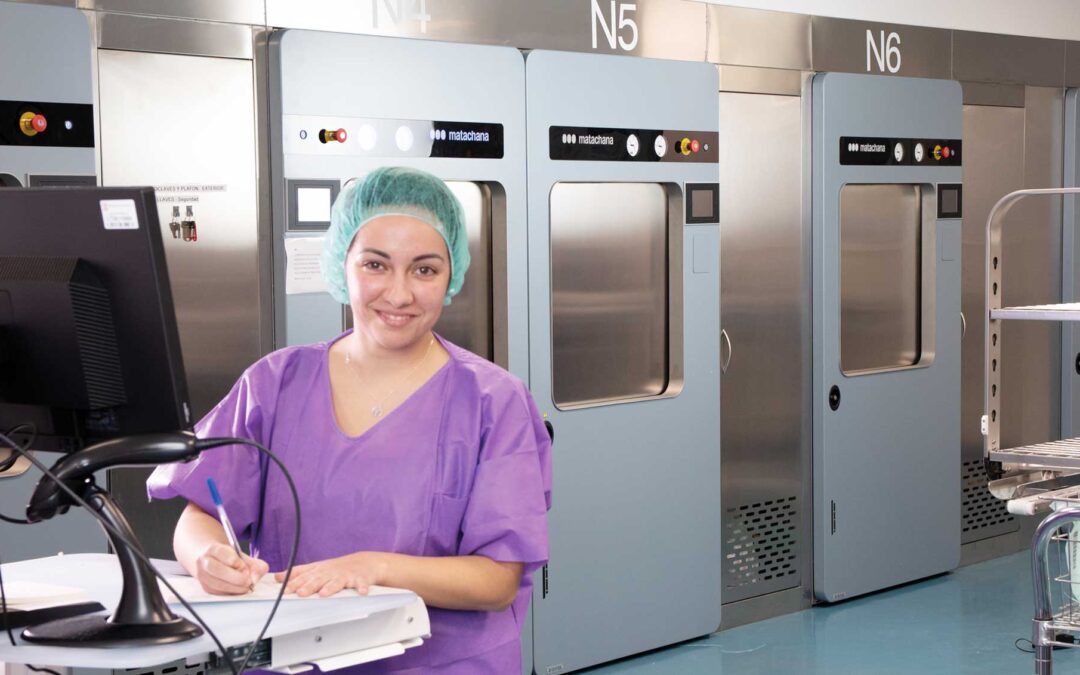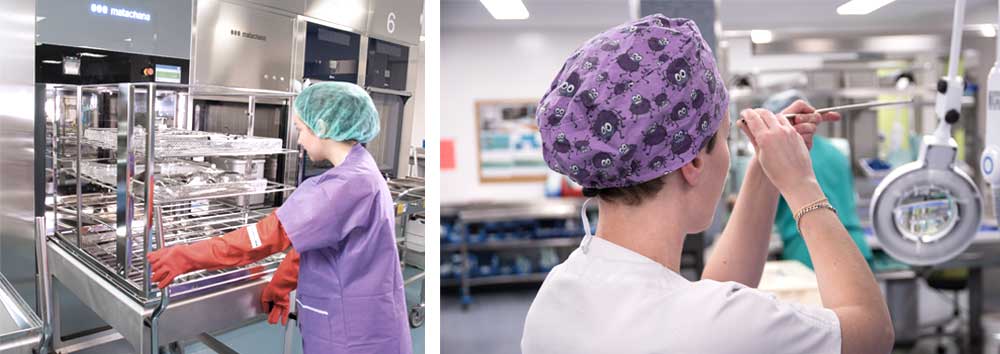MIEC Studies Department
STAFF RESPONSIBILITIES IN RUMED1
Sterile processing departments are the backbone of hospitals and surgical centres. Without a well-trained and detail-oriented staff and thoroughness, hospital infection rates are likely to increase. And as we all know, healthcare associated infections (HCAIs) are extremely dangerous to public health.
Proper training of RUMED staff is therefore crucial and has a direct impact on patient safety during and after surgery, so it is essential that RUMED staff perform their responsibilities correctly.
The staff for these services are in charge of many activities that, indirectly, have an impact on proper patient care. The following are some examples of the usual tasks of this team:
- Collection of contaminated instrument sets from all client points in the hospital.
- Sorting of contaminated sets and individual instruments for selection of the manual/automatic process validated by the hospital.
- Decontamination of all these instruments and healthcare devices.
- Inspection and preparation of trays, boxes, containers and bags of items prior to sterilisation in the different equipment.
- Packaging and packing of instruments for sterilisation based on the technologies available in the Healthcare Facility and in accordance with the Reprocessing Instructions from the medical device manufacturers.
- Sterilisation equipment monitoring and use
- Delivery of sterile instrument sets to operating theatres and other patient care areas
- Maintaining detailed records of all procedures carried out in the Reprocessing Unit.
- Controlling and ordering the necessary consumables to maintain and guarantee the functionality of the service, and monitoring the expiry dates and the integrity of the packaging and containers for each sterilised item.
- Instrument inventory control, one of the most important assets that healthcare centres possess and one that is often poorly monitored.
- Complete and documented traceability of all processed items, in order to obtain real-time information on the aseptic status and location of each processed item.
Reprocessing staff must ensure that the procedures performed in this service are in accordance with local and international guidelines and recommendations, so that their patients can be safe during the surgical procedure. Staff must take into account all necessary measures to eliminate micro-organisms and potentially harmful substances on medical instruments, which makes the RUMED a strategic service in any healthcare facility.
FACTORS INCREASING THE INCIDENCE OF ADVERSE EVENTS
The healthcare workers themselves often mistakenly perceive that sterilisation alone is sufficient to ensure that instruments are ready for reuse. As we know, reprocessing of devices is a multi-step practice involving proper cleaning followed by disinfection and/or sterilisation. Failure in any of these actions threatens the integrity of the process, which would pose a risk of contamination for the instruments and, therefore, our patients.
Both the new European Medical Device Regulation (MDR 2017/745) and the FDA require medical device manufacturers to provide detailed instructions for use (IFUs) for correct reprocessing using validated processes. These documents provide guidance for healthcare professionals on how to safely clean, disinfect, sterilise and maintain the functionality of instruments prior to reuse in any healthcare procedure.
In addition to the intrinsic challenges associated with all these processes, there are other factors that may increase the incidence of certain adverse events:
- La presión ejercida sobre estos servicios para que entreguen rápidamente los instrumentos en los procedimientos programados, en muchos casos, con carencia o insuficiente stock, lo que podría obligar al personal a adoptar atajos/prácticas arriesgadas.
- The pressure on these services to deliver instruments quickly for scheduled procedures, in many cases with shortages or insufficient stock, and which may force staff to adopt shortcuts/risky practices.
- Long, complex and confusing IFUs from manufacturers, which can make reprocessing of more complex instruments difficult.
- Delays in the arrival of “borrowed” instruments from external suppliers that need to be reprocessed before being sent to the operating theatre.
- Requests for reprocessing outside normal RUMED working hours.
- Inadequate training of staff who do not normally work in these services and who have to deal with requests for materials outside working hours: at night, in emergencies, at weekends, etc.
- Poor communication between theatre staff and Reprocessing Unit staff to align the needs of each service.
- Lack of implementation of standardised and traceable procedures at certain stages of the reprocessing loop, which can lead to a lack of repeatability of procedures and documentation.
- And in some cases, a poorly organized and inefficient working environment, prone to distractions
Nor should we forget that new medical devices linked to innovative surgical practices are constantly arriving in our hospitals, which means a progressive technological updating and adaptation of the service and its staff.
CONCLUSIONS
In general, reprocessing failures compromise patient safety by compromising the efficacy and integrity of medical devices with all the consequences that this entails.
A coordinated and organised RUMED relies on properly trained, prepared staff who are fully aware of and responsible for their tasks. Mistakes can be frequent without knowledge, adequate tools, information and resources.
BIBLIOGRAPHY USED
- The importance of SPD and OR working together [Internet]. Infection Control Today. 2010 [scheduled for 20 August 2023]. Available in: https://www.infectioncontroltoday.com/view/importance-spd-and-or-working-together
- Moab Healthcare. 5 Fun Facts about sterile processing [Internet]. Moab Healthcare. 2020 [scheduled for 16 August 2023]. Available in: https://moabhealthcare.com/5-fun-facts-about-sterile-processing/
- SPD – It’s a dirty job, and thank God someone does it [Internet]. Hospital News. 2005 [scheduled for 14 August 2023]. Available in: https://hospitalnews.com/spd-its-a-dirty-job-and-thank-god-someone-does-it/
- Perri L. What your sterile processing department wants surgeons to know [Internet]. Infection Control Results. 2020 [scheduled for 18 August 2023]. Available in: https://www.infectioncontrolresults.com/surgical-sterile-processing




Latest comments